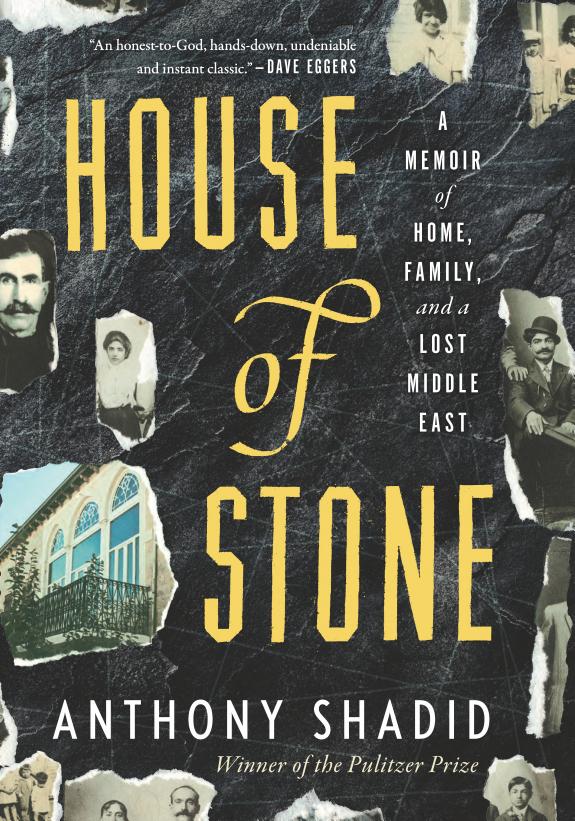
Armchair travel around the world!
Start your reading adventures with our FREE Reading Atlas.

- Around the World in 14 Books
- 7 Thrilling Book Series
- 6 Audiobooks That Are Like Theater For Your Ears



This moving memoir (338 pages) was published in February of 2012 by Houghton Mifflin Harcourt. The book takes you to modern Lebanon. Melissa read House of Stone and loved it; it wouldn't be on our site if she didn't recommend it.
Bookshop.org is an online bookstore with a mission to financially support independent bookstores and give back to the book community.

This bittersweet memoir is the story of Pulitzer Prize-winning journalist Anthony Shadid’s quest to restore his family’s ancestral home in the village of Marjayoun in southern Lebanon.
For decades, Anthony Shadid was one of the best foreign correspondents covering the Middle East. He wrote for The New York Times and The Washington Post and won the Pulitzer Prize twice — in 2003 and in 2010 — for his coverage from Iraq.
In 2006, Shadid was in country, reporting on Lebanon’s conflict with Israel. He visited his family’s hometown and found his family’s now-crumbling estate. About 100 years before, his great-grandfather Isber had built a beautiful home. It was made of stone with decorative arches over the doorways and windows decorated with ornate metalwork. His garden was lush with olive and orange trees.
But when Anthony found it in 2006, it was a ruin, abandoned long ago by the family and destroyed by endless war. The plaster was chipped and flaking; the garden was overrun with weeds.
So he decided to take a year off from work to restore the house. Partly to honor his great-grandfather’s dream but mostly because he was exhausted after years of covering conflicts in the Middle East.
This book weaves the personal story of Shadid’s family with the region’s history and the day-to-day adventures (and misadventures) of literally trying to put his house in order.
It’s no surprise that Shadid does a bang-up job of making complex history more than dates and names. He has a palpable nostalgia for the time when Lebanon, Syria, Jordan, and Israel weren’t countries with borders but were simply The Levant. He calls it a ‘lost era of openness… when all sorts drifted through homelands shared by all.’
But he’s equally taken with modern Lebanon. He introduces us to the fascinating, real-life characters he meets, including a doctor who handcrafts ouds and bouzoukis, a cynical chef, craftsmen with no sense of budget or timeline, and nosy relatives. And everywhere, the gossip and unsolicited opinions. For a long time, the townspeople think he’s crazy or a spy or both. They assume he’s rich, and they’re endlessly curious about how much he pays for things. Mostly so they can mock him for paying too much.
One of the most highly contested elements of the restoration involves tiles. Tiles! Shadid falls helplessly in love with the idea of decorating the floors with cemento tiles — the traditional floor covering decorated with colorful geometric patterns. The selection, buying, transport, and installation of those tiles become an epic saga that highlights the differences in Western and Middle Eastern thinking.
Shadid has the insight of a journalist but crafts sentences like a poet. In a passage explaining why these tiles mean so much to him, he writes, ‘Cultures that may seem as durable as stone can break like glass, leaving all the things that held them together unattended. I believe that the craftsman, the artist, the cook, and the silversmith are peacemakers. They instill grace; they lull the world to calm.’
Eventually, Shadid finished the house. He returned to reporting, got married, and wrote this book. But sadly, just two weeks before it was released, he died in Syria: While covering the resistance against the government, he died from an asthma attack. After he was cremated, his wife buried his ashes between the two olive trees in his garden in Marjayoun.
Olive trees are ubiquitous in Marjayoun, with forests scattered throughout the plain near Deir Mimas, on the way to the Litani River. Glowing in the pink light of dusk, the trees are as lonely as they are rugged, centuries sometimes interred in their gnarled trunks… It seems appropriate that these eccentric-looking trees produce the odd, delicious product called the olive. Olives may be the subtlest of fruits, though I had never really considered them until I arrived in Marjayoun, where they are requisite at every meal and often inspire spirited conversations over their origins and attributes (sometimes fantastical). The olive is malak al-sufra, after all, the king of the table, and its disposition and appearance must be kept under constant scrutiny as harvest approaches. Timing, I learned, is everything. — Anthony Shadid
Wanna help us spread the word? If you like this page, please share with your friends.
Strong Sense of Place is a website and podcast dedicated to literary travel and books we love. Reading good books increases empathy. Empathy is good for all of us and the amazing world we inhabit.
Strong Sense of Place is a listener-supported podcast. If you like the work we do, you can help make it happen by joining our Patreon! That'll unlock bonus content for you, too — including Mel's secret book reviews and Dave's behind-the-scenes notes for the latest Two Truths and a Lie.
Join our Substack to get our FREE newsletter with podcast updates and behind-the-scenes info — and join in fun chats about books and travel with other lovely readers.

We'll share enough detail to help you decide if a book is for you, but we'll never ruin plot twists or give away the ending.
Content on this site is ©2026 by Smudge Publishing, unless otherwise noted. Peace be with you, person who reads the small type.